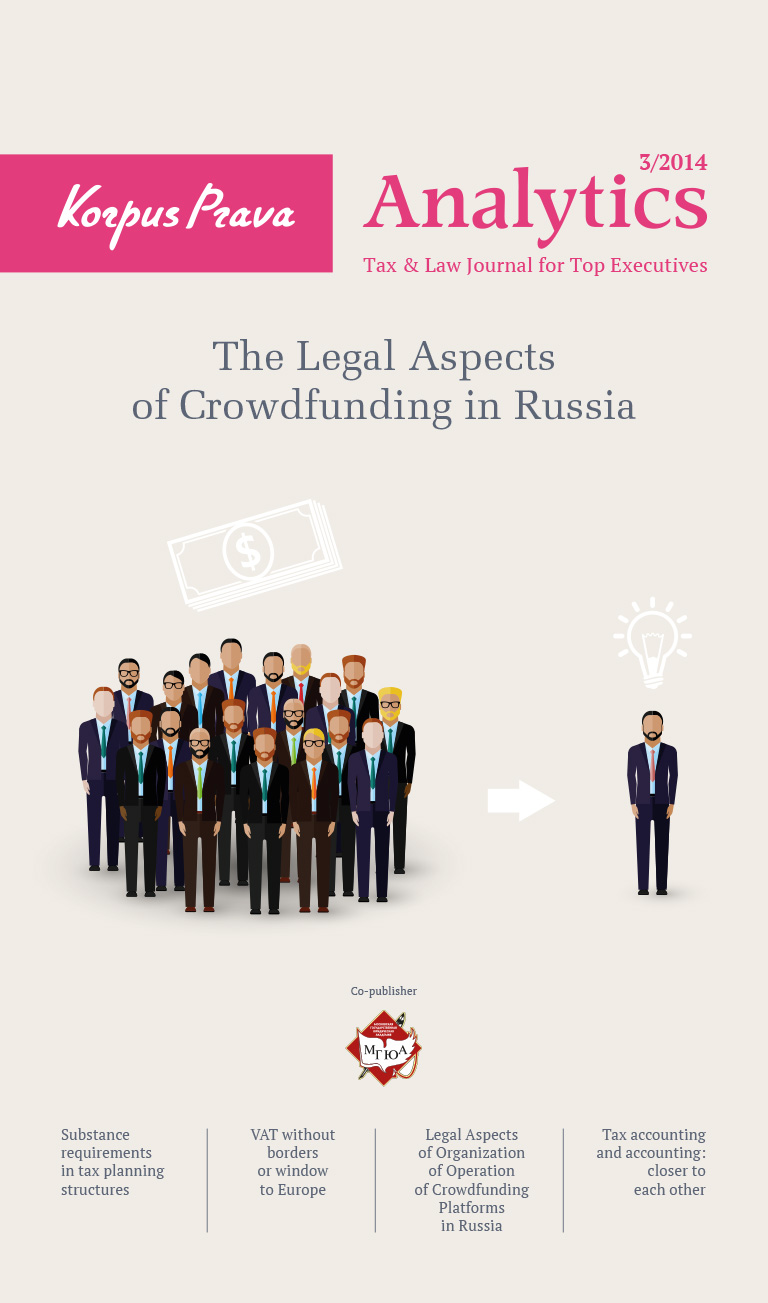- Cyprus Citizenship Scheme for Foreign Investors
- Squeezed But Pleased: Taxation of Passive Income in the European Union
- VAT Without Borders or Window to Europe
- Legal Aspects of Organization of Operation of Crowdfunding Platforms in Russia
- Substance Requirements in Tax Planning Structures
- “Deposit Splitting” of Individuals. Legal Civil and Criminal Aspects
Special Instance, Professional Representation, Continuous Cassation and Other Changes in the Process
In 2019, major changes for the recent years – the so-called procedural revolution – took place. On October 1, three key laws that reform the system of general jurisdiction courts and change the rules of court procedure came into force:
- Reformation of the judiciary system – Federal Constitutional Law No. 1-ФКЗ On Introduction of Amendments to Federal Constitutional Laws Due to Formation of General Jurisdiction Courts and General Jurisdiction Courts of Appeal dated 29.07.2018.
- Reformation of the judiciary system – Federal Law No. 451-ФЗ On Introduction of Amendments to Certain Legal Acts of the Russian Federation dated 28.11.2018.
- On class actions – Federal Law No. 191-ФЗ On Introduction of Amendments to Certain Legal Acts of the Russian Federation dated 18.07.2019.
The procedural reform is aimed at strengthening the independence of judges and increasing the effectiveness of justice. Among the main innovations are the following: formation of new courts, continuous cassation in general jurisdiction courts, introduction of educational qualification for representatives, changes in the procedure for issuing writs of execution, the possibility to file class actions.
Let us consider these innovations in detail.
Formation of new courts
On October 1, 2019, 5 courts of appeal and 9 courts of cassation officially started their work. Each of the new courts operates within the respective judicial district which includes several regions. The territorial jurisdiction of each general jurisdiction court of cassation includes 7 – 13 constituent entities of the Russian Federation, and the jurisdiction of each general jurisdiction court includes 14 – 21 constituent entities of the Russian Federation.
The innovation lies in extraterritoriality – judicial districts of appeals and cassations do not match the administrative structure of the country which will make it possible to increase the independence of judges.
New courts of appeal review cases that are resolved by courts of constituent entities at the first instance (Supreme Courts of the republics, regional courts, territorial courts). They are also in charge
of disputes over new or newly discovered circumstances. The new courts of appeal will also be higher courts in relation to Supreme Courts of the republics, regional courts, etc. operating in the territory.
In a similar fashion, general jurisdiction courts of cassation also consider cases as courts of cassation on new or newly discovered circumstances. They are higher courts in relation to general jurisdiction federal courts and magistrate judges operating in the territory of the relevant judicial cassation district.
The judicial reform also provides for the possibility to participate in consideration of petitions of appeal and cassation remotely subject to the relevant motion via a video conferencing system.
Continuous cassation
On the proposal of the Supreme Court, the conceptual approach to cassation justice has been changed. One of the main innovations is introduction of the so-called continuous cassation, which is customary for arbitral proceedings, in general jurisdiction courts. Appeals are now considered in courts without any prior selection. Previously, this issue was put at the discretion of the court of cassation judge who might not have not always forwarded the appeal for consideration. Formerly, only a small number of appeals reached the court of cassation. Thus, according to the Supreme Court, in 2018, among the petitions of cassation filed to presidiums of regional courts, about 10% of appeals on criminal cases, 5% of appeals in civil cases and 4% of appeals on administrative cases were considered at court hearings.
According to the reform ideologues, the innovation will make it possible to replace the selective verification of court decisions with the mandatory one and increase the independence of courts since new courts have been formed in specially established districts that do not match the administrative structure.
Educational qualification for representatives
Legal representation becomes professional. The reform has established requirements for representatives in courts – now they can only be lawyers and persons with a higher legal education, academic degree. Now, in the process, in addition to a power of attorney, a representative is required to present their diploma of a higher legal education or confirmation of a legal academic degree.
This rule shall apply to arbitral, civil and administrative proceedings. However, it is possible to litigate at magistrate judges and in district courts. The educational qualification shall not apply to patent attorneys on disputes concerning intellectual property protection, insolvency practitioners on bankruptcy cases. It is noteworthy that the new requirements shall also not apply to statutory representatives. For instance, a director general would not have to get a legal education or degree to represent the interests of their company in court.
Writ proceedings
Since October, the number of cases has grown in arbitral and civil proceedings where it is required to file an application for issue of a court order instead of filing an action.
Changes in the Arbitration Procedure Code
The maximum amount of claims arising from non-performance or improper performance of an agreement has increased from 400,000 to 500,000 rubles. The mention of the fact that a debtor acknowledges but does not fulfill documents establishing monetary obligations has been excluded.
In a similar fashion, the amount of claims based on a notarized protest of a promissory note for non-payment, non-acceptance and non-dating has increased.
Changes in the Code of Civil Procedure
An application for issue of a court order must be filed concerning requirements on recovery of a debt not more than 500,000 rubles:
- On any communication services (not just telephone communication services as before);
- On expenses for complete overhaul and maintenance of common property in a multi-unit apartment building;
- On mandatory payments and contributions made by members of any property cooperative (not just housing cooperatives as before);
- On mandatory payments and contributions made by members of any consumer cooperative (not just building cooperatives as before).
Writs of execution issued upon application
Procedure for issuing writs of execution has changed. Under the new rules, in civil and arbitral proceedings, writs of execution will be issued upon application of the recoveror. An application is not required if a writ of execution is needed to recover money to the budget. Such rule has been established in a similar manner to the applicable provision of the Administrative Procedure Code in consideration of administrative cases.
Class actions
From October 2019, individuals can file class actions to general jurisdiction courts. Previously, this option was available only to entrepreneurs in arbitral proceedings. Under the old rules, it was possible for individuals to file class actions to general jurisdiction courts only when they were initiated by consumer protection associations, the prosecutor’s office or local authorities. Those who were not entrepreneurs could not file an action for the benefit of a group of persons, and consumers could only combine actions of the same type in court, but the actions were considered separately, other individuals were not able to join the actions. New law No. 191-ФЗ introduces amendments to the Arbitration Procedure Code and the Code of Civil Procedure and re-starts the class action institution in Russia.
What should be known?
- Terms of filing a class action:
- Common defendant;
- Similar factual circumstances of the action;
- Common or uniform rights of members of a group of persons/entities;
- The uniform way to protect rights.
- Who can file a class action?
To protect the rights of a group, one of its members may file a class action, and in certain cases stipulated by law it may be another person/entity (for instance, a consumers’ association).
- Is it possible to join the group?
Yes, it is. It can be done in filing of the statement of claim or during consideration of the action. An application must be filed to court or a form must be filled in on the court website or in the Justice State Information System.
- Are decisions on class actions important for other similar actions?
Yes, they are. Such a decision has prejudicial value. The exception is a situation when plaintiffs dispute previously established facts.
Your subscription to our journal will definitely boost the efficiency of your specialists and downsize your expenses for consultants.
The journal is available free of charge in the electronic version.
Free Download

